Recommended Reads
By David Silverstein
To be successful in business and in life, we have to collect and connect the information all around us—dots. But we need dots that range far and wide and sometimes that means taking a deeper dive. With that in mind, I’ve assembled a list of the books I think you’ll find most useful or interesting. Not every book will appeal to you so, with the brief reviews provided, you can choose where to go deeper. In each case, though, I’ve already vetted the book as being well written, informative and objective.
Leadership & Communication
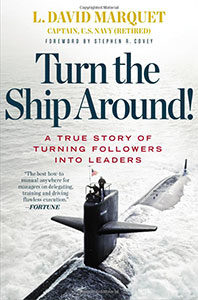 Turn the Ship Around
Turn the Ship Around
This is perhaps the best book that’s been written on leadership in decades. Captain David Marquet, a former US submarine commander, tells his story of turning around the USS Santa Fe, the worst ship in the US Navy’s submarine fleet at the time he assumed command. Marquet essentially throws away the manual on how a military unit is run and in short order creates one of the most effective teams the US Navy has ever known. What’s most valuable about this book is its real-life twists and turns. For example, Marquet learned the hard way that there are very important prerequisites to empowering a workforce. It’s not just about deciding to no longer micromanage. Empowerment demands doubling down on investment in training and cross training, and establishing clear expectations. Without them, empowerment is doomed to fail. Marquet doesn’t get into theory. He doesn’t hypothesize. He shares real stories of what works and what doesn’t. If you don’t believe my review, just ask Stephen Covey who personally wrote the forward to this book.
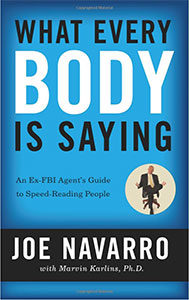 What Every BODY Is Saying
What Every BODY Is Saying
We tend to take a “one size fits all” approach to communication—based on OUR style. But imagine if you could truly “read” the person you’re talking to. Are they comfortable with what you’re saying? Are they opening up like they say they are? Are they holding something back or even being dishonest? This book is the best that’s ever been written on the subject of reading body language. Author Joe Navarro, a former FBI counterintelligence officer and expert on non-verbal communication, calls it “speed reading” people to decode their sentiment and behavior. At the same time, learning to read others goes a long way toward raising our own self-awareness, enabling us to better manage our own body language.
Mind & Body
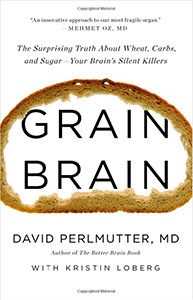 Grain Brain
Grain Brain
You might regret reading this book if you’re not looking for a life changing event. Grain Brain is not about the influence of grains (and other carbs) on our body but on our brain. What’s most difficult to accept, however, is that unlike the near-term feedback we receive about our body (by looking in the mirror or stepping on the scale), the negative effects on our minds can be decades in the making and we don’t see or feel them. It’s somewhat like what happens to young smokers who don’t experience any of the seriously ill effects of smoking until much later in life—when it’s often too late to do anything about it. The day I read Grain Brain I couldn’t pick up a beer (or any other carb-loaded food). Tell me what something does to my body, and I know I can work it off at the gym. But tell me that what I eat significantly increases my likelihood of Alzheimer’s or Parkinson’s diseases later in life and I’m not sure I’ll ever turn back.
Grain Brain is well researched and well written and it might just be the most important book you’ll ever read.
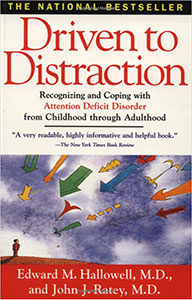 Driven to Distraction
Driven to Distraction
In today’s society words like ADD and ADHD are thrown around all the time, especially when talking about kids but increasingly with adults, too. Many A-type business people joke (or someone jokes for them) about having “adult ADD” as though that’s not something that’s real. Driven to Distraction offers easy-to-understand stories and examples from those who suffer from ADD. Understanding ADD is becoming as important as understanding childhood obesity and diabetes (in kids and adults). You don’t have to have ADD or a child with ADD to benefit from understanding it. You likely have many employees, friends or family members who have one form of ADD or another. It’s not such a terrible thing, and, in fact, some adults choose not to treat it, feeling it gives them their “edge” or unique identity. Demystifying ADD is extremely important today and this book is an easy, sometimes even entertaining, read that has become the de facto standard on the subject.
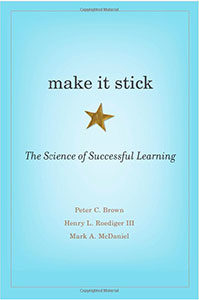 Make It Stick
Make It Stick
Everyone should collect dots—but to what end? Collecting dots is only valuable if 1) you retain important dots and 2) you connect dots to develop deeper insights. Make It Stick (not to be confused with Made to Stick), shatters much of our conventional thinking about learning. For example, early on as a writer I learned that certain fonts were easier to read—and they are. Sarif fonts, for example, have the little “feet” on them that make them easier to read. So, we’ve all been taught to use them—it’s better for our readers, making the letters easier to follow. Now we learn—through robust research—that “easier” isn’t always better. Make something just a little harder to read and that extra effort goes a long way to embedding what you’ve read deeper in memory. Much of the author’s insights are startling at first but quickly make perfect sense once explained. While the book seems aimed toward education—parents, students, teachers—I have found the lessons of this book incredibly valuable in my own life as a business person faced with the need to consume lots and lots of information.
International
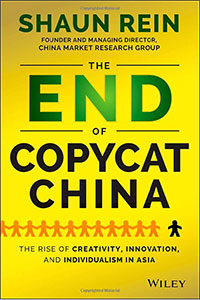 The End of Copycat China
The End of Copycat China
A few years ago it was all but a given that to succeed in international business, you had to be in China. But not so fast. Shaun Rein made a name for himself with his first book on China, The End of Cheap China. In this update on what’s happening in China, he provides insights into how, in just a few short years, the dynamics have changed. Labor costs are increasing. Simply copying and importing business models is no longer a successful strategy. Public perceptions of China, stereotypes, and even what’s taught in American business schools can be terribly outdated. So much of what we think we know about China is simply wrong, but since our perceptions are founded on real experiences, they’re hard to shake. China is no longer a place for low-cost manufacturing or to build lower cost R&D centers to serve the rest of the world. To succeed in China, companies must innovate—to meet the needs of Chinese consumers and businesses. With 1.3 billion people, innovating FOR China is fast becoming a do or die imperative. If you operate a business internationally, and especially if you’re in or have aspirations to be in China, this book is a must read.
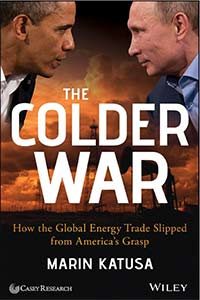 The Colder War
The Colder War
Also important to understanding international business, but with much more emphasis on the geo-political realities, The Colder War is insightful and informative. With implications for energy, the future of the US dollar as a global reserve currency, relations between China and Russia, and understanding both Vladimir Putin and the Russian people, this book quickly becomes a must read. There is much more complexity to the current Russia than most of us understand. The Colder War offers an historical perspective, explaining how we’ve arrived where we are today, and it offers a window into the future that is, to say the least, a little scary. If the influence Putin and Russia have on the world is of interest to you, this book should be high on your reading list.
Strategy & Innovation
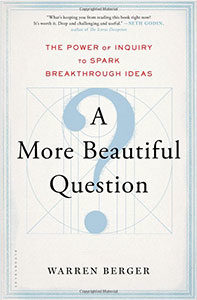 A More Beautiful Question
A More Beautiful Question
We all know how important it is to ask questions. But learning how to ask insightful questions is harder than you think. Chock full of great stories—inspiring stories—this book goes into the serious science of questions. Starting with an understanding of why kids ask far more questions than adults, it takes us through life explaining the social barriers we face when asking questions later in life. Both business book and life-long self-help book, A More Beautiful Question will help you become a better parent, teacher, manager, leader or just a better you. As with most things, knowing to do more of something can give you a leg up on the next person, but learning how to do it well can give you two legs up. For anyone interested in becoming better—at anything—this book is invaluable.
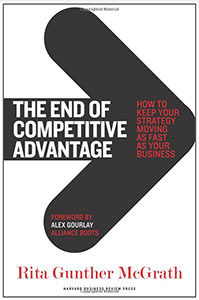 The End of Competitive Advantage
The End of Competitive Advantage
Rita Gunther McGrath is one of today’s foremost thinkers on strategy and she takes on Michael Porter head-to-head. To make her point—that business is more dynamic than ever and a seemingly successful strategy effectively has a short half-life—she goes just a little overboard with the title and some of her thinking on competitive advantage, but don’t be fooled. As with most things, to make a point stick, we need to swing the pendulum a little further than seems necessary. Her points are spot on and are well articulated. The truth is that when it comes to strategy nothing can be grounded purely in research because strategy evolves every day. Sit back and wait for the longitudinal studies to prove what works and what doesn’t and whatever is proven will be so commonplace by the time you’re ready to use it that it will be worthless. Instead we need to turn to bright, articulate super thinkers like McGrath to gain the insights we need now. This is one of the best books on strategy written in years.
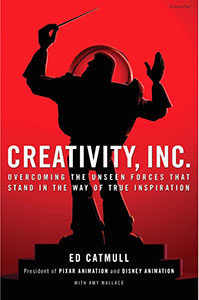 Creativity, Inc.
Creativity, Inc.
Even if you don’t immediately think of yourself as a strategist or innovator, you’ll enjoy Creativity, Inc. That’s because we are all consumers of the subject’s products: Pixar movies. This book is a generous look inside the real world of creativity and it reminds us just how hard it is—even for those that we think are the most creative among us. Pixar is an amazing success story, but author Ed Catmull tells it like it is—the trials and tribulations, the challenges and failures on the way to success…nothing comes easy. This book will make you feel better each time you or your organization tries to do something creative and doesn’t. It will also remind you to keep trying and to recognize that there are no silver bullets. Creativity is not all fun and games. For anyone who wants to be more creative or who is responsible for driving innovation in their organization, this book provides a great deal of otherwise missing perspective.
Bonus (Fun, Relaxing or Useful)
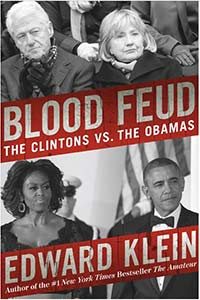 Blood Feud
Blood Feud
This was perhaps the most entertaining book I read all year. Your own politics aside, the so-called feud is the battle of wills between the Obamas (Barack and Michelle) and the Clintons (Bill and Hillary). There’s plenty of room to question whether the author could really know—or have learned—what went on inside private conversations that took place behind closed doors, or that he can get inside the heads of these four actors as he claims, but if even a fraction of what he writes is true, and there’s plenty of reason to believe it is, Blood Feud offers a rare glimpse inside high-stakes politics. If nothing else, I found this a light and easy read that had me intrigued and chuckling all at the same time.
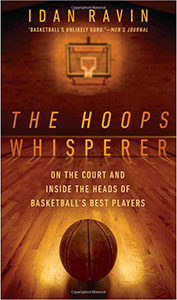 The Hoops Whisperer
The Hoops Whisperer
Author Idan Ravin is the most unlikely of personal coaches for some of the NBA’s biggest superstars. His stories reek of authenticity and provide a rare look into what elite athletes really go through to improve their competitiveness. At the same time, Ravin’s own story of how he accidentally evolved into the “Hoops Whisperer” is itself fascinating. If you don’t like basketball or won’t recognize the names of its biggest stars, this book might not be so interesting to you. But whether you coach third graders or are just a fan, if basketball interests you, you’ll enjoy this book immensely.
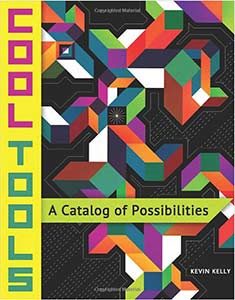 Cool Tools
Cool Tools
Part catalog, part stories and anecdotes, Cool Tools is the most comprehensive guide to tools and gadgets and how to get stuff done. If you like to tinker, to fix things, or to play around with the latest new gadgets, you’ll enjoy Cool Tools. It makes a great coffee table book, too!
David Silverstein is the CEO and founder of the Lean Methods Group. He is a frequent public speaker and author.

